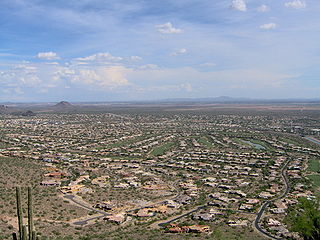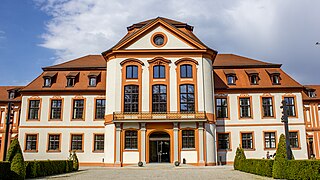
The United Nations Economic Commission for Europe (ECE) is one of the five regional commissions under the jurisdiction of the United Nations Economic and Social Council. It was established in order to promote economic cooperation and integrations among its Member States.
Regional planning deals with the efficient placement of land-use activities, infrastructure, and settlement growth across a larger area of land than an individual city or town. Regional planning is a sub-field of urban planning as it relates land use practices on a broader scale. It also includes formulating laws that will guide the efficient planning and management of such said regions.

Gottfried Semper was a German architect, art critic, and professor of architecture, who designed and built the Semper Opera House in Dresden between 1838 and 1841. In 1849 he took part in the May Uprising in Dresden and was put on the government's wanted list. Semper fled first to Zürich and later to London. Later he returned to Germany after the 1862 amnesty granted to the revolutionaries.

Landscape ecology is the science of studying and improving relationships between ecological processes in the environment and particular ecosystems. This is done within a variety of landscape scales, development spatial patterns, and organizational levels of research and policy.

Urban sprawl or suburban sprawl mainly refers to the unrestricted growth in many urban areas of housing, commercial development, and roads over large expanses of land, with little concern for urban planning. In addition to describing a particular form of urbanization, the term also relates to the social and environmental consequences associated with this development. In Continental Europe the term "peri-urbanisation" is often used to denote similar dynamics and phenomena, although the term urban sprawl is currently being used by the European Environment Agency. There is widespread disagreement about what constitutes sprawl and how to quantify it. For example, some commentators measure sprawl only with the average number of residential units per acre in a given area. But others associate it with decentralization, discontinuity, segregation of uses, and so forth.

Spatial planning systems refer to the methods and approaches used by the public and private sector to influence the distribution of people and activities in spaces of various scales. Spatial planning can be defined as the coordination of practices and policies affecting spatial organization. Spatial planning is synonymous with the practices of urban planning in the United States but at larger scales and the term is often used in reference to planning efforts in European countries. Discrete professional disciplines which involve spatial planning include land use, urban, regional, transport and environmental planning. Other related areas are also important, including economic and community planning. Spatial planning takes place on local, regional, national and inter-national levels and often results in the creation of a spatial plan.
Mário Rodrigues Breves Peixoto was a Brazilian film director, mainly known for his only film Limite, a silent experimental film filmed in 1930 and premiered in Rio de Janeiro on 17 May 1931. Peixoto wrote, directed and took up a minor role in the film. Its musical score includes Erik Satie, Claude Debussy, Alexander Borodin, Igor Stravinsky, Sergei Prokofiev and César Franck.
Sustainable cities, urban sustainability, or eco-city is a city designed with consideration for social, economic, environmental impact [1][1], and resilient habitat for existing populations, without compromising the ability of future generations to experience the same. These cities are inhabited by people whom are dedicated towards minimization of required inputs of energy, water, food, waste, output of heat, air pollution - CO
2, methane, and water pollution. Richard Register first coined the term "ecocity" in his 1987 book, Eco city Berkeley: Building Cities for a Healthy Future. Other leading figures who envisioned the sustainable city are architect Paul F Downton, who later founded the company Ecopolis Pty Ltd, as well as authors Timothy Beatley and Steffen Lehmann, who have written extensively on the subject. The field of industrial ecology is sometimes used in planning these cities.
The European Spatial Development Perspective (ESDP) is a document approved by the Informal Council of Ministers of Spatial Planning of European Commission in Potsdam in 1999. It is a legally non-binding document forming a policy framework with 60 policy options for all tiers of administration with a planning responsibility. The strategic aim is to achieve a balanced and sustainable spatial development strategy.
Patsy Healey OBE FBA FAcSS is a British urban planner. She is professor emeritus at Global Urban Research Unit in the School of Architecture, Planning & Landscape, at Newcastle University. She is a specialist in planning theory and practice, with a particular focus on strategic spatial planning for city regions and in urban regeneration policies. She is Senior Editor of Planning Theory and Practice journal, jointly published by TandF and the RTPI.
Cliff Hague is a British town planning practitioner and Emeritus Professor of Planning and Spatial Development at Heriot-Watt University, Edinburgh.
Simin Davoudi FAcSS is Professor of Environmental Policy and Planning at Newcastle University. She is Past President of the Association of European Schools of Planning (AESOP) and, as coordinator of the Planning Research Network, advised the Department of Communities and Local Government on its research priorities until 2007. Currently, she is a member of the DCLG Expert Panel on Housing market and Planning, and is expert advisor for the DG Environment of European Commission for Urban Environment.
Hermann Knoflacher is an Austrian civil engineer. He was the head of the Institute for Transport Planning and Technology at the Vienna University of Technology.

Martina Löw is a German sociologist.

Michael Ulrich Hensel is a German architect, researcher, educator and writer. His main areas of interest are "performance-oriented Design" and "Performance-oriented Architecture". Hensel has been a key proponent of interdisciplinary research by design in architecture since the mid-1990s, founding and current chairman of OCEAN Design Research Association and SEA – Sustainable Environment Association. He is a prolific writer whose work has been published world-wide.
UrbanSim is an open source urban simulation system designed by Paul Waddell of the University of California, Berkeley and developed with numerous collaborators to support metropolitan land use, transportation, and environmental planning. It has been distributed on the web since 1998, with regular revisions and updates, from www.urbansim.org. Synthicity Inc coordinates the development of UrbanSim and provides professional services to support its application. The development of UrbanSim has been funded by several grants from the National Science Foundation, the U.S. Environmental Protection Agency, the Federal Highway Administration, as well as support from states, metropolitan planning agencies and research councils in Europe and South Africa. Reviews of UrbanSim and comparison to other urban modeling platforms may be found in references.
Sustainable land management (SLM) refers to practices and technologies that aim to integrate the management of land, water, biodiversity, and other environmental resources to meet human needs while ensuring the long-term sustainability of ecosystem services and livelihoods. The term sustainable land management is used, for example, in regional planning and soil or environmental protection, as well as in property and estate management.

The Gaborone Dam is a dam on the Notwane River in Botswana with a capacity of 141,100,000 cubic metres (4.98×109 cu ft). The dam is operated by the Water Utilities Corporation, and supplies water to the capital city of Gaborone.

Daniella Tilbury is a Gibraltarian academic, educator and sustainable development leader who was the first woman in her country to hold the title of university professor. The inaugural Vice-Chancellor and CEO of the University of Gibraltar, Tilbury, who has long been involved in sustainability issues became the first Commissioner for Sustainable Development in May 2018. She was recognized as an honorary Don of St Catharine's College, Cambridge in July 2018 because of her scientific and social contributions.
Ákos Moravánszky, is a Swiss-Hungarian architect, theorist, historian and Adjunct Professor Emeritus of Architectural Theory at the Institute for the History and Theory of Architecture at the Swiss Federal Institute of Technology in Zurich. Moravánszky is regarded as one of the world's leading architecture historians of Central European architecture.













